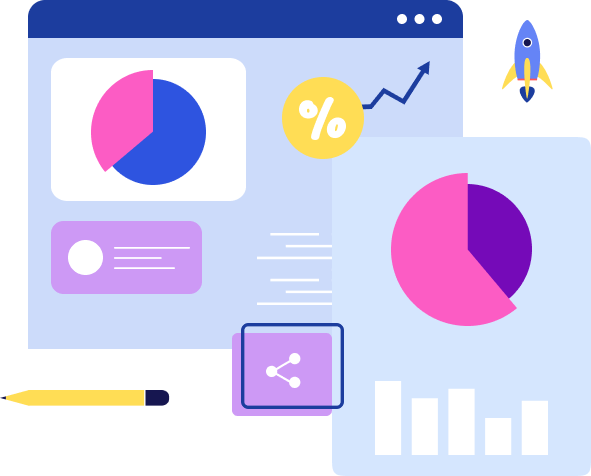
In today’s data-driven world, the importance of data analytics in business cannot be overstated. From enhancing decision-making capabilities to driving business growth, data analytics offers a multitude of benefits that can significantly impact a company’s bottom line. This blog will delve into the role of data analytics, key techniques, its business impact, and how companies like Global Outs provide custom solutions to leverage these insights effectively.

Role of Data Analytics
Data analytics involves the process of collecting, processing, and analyzing large sets of data to uncover patterns, correlations, and insights that can inform business decisions. It enables businesses to make evidence-based decisions, improve operational efficiency, and create targeted marketing strategies. By harnessing the power of data, companies can gain a competitive edge and drive innovation (McKinsey & Company) (Penn LPS Online).
Enhancing Decision-Making Capabilities
One of the primary roles of data analytics is to enhance decision-making capabilities. By analyzing historical data and current trends, businesses can make more informed decisions, reducing the risk of costly mistakes. Data-driven decision-making allows companies to identify opportunities for growth, optimize operations, and develop strategies based on empirical evidence rather than intuition (Penn LPS Online).
Improving Customer Insights
Data analytics provides valuable insights into customer behavior and preferences. By analyzing customer data, businesses can better understand their target audience, personalize marketing efforts, and improve customer satisfaction. This customer-centric approach not only boosts sales but also fosters customer loyalty and retention (Penn LPS Online).
Key Techniques in Data Analytics
Several key techniques are used in data analytics to extract meaningful insights from raw data. These techniques include descriptive analytics, predictive analytics, and prescriptive analytics.
Descriptive Analytics
Descriptive analytics involves summarizing historical data to understand what has happened in the past. It uses data aggregation and data mining techniques to provide insights into past performance, helping businesses identify trends and patterns (McKinsey & Company).
Predictive Analytics
Predictive analytics uses statistical models and machine learning algorithms to predict future outcomes based on historical data. This technique helps businesses anticipate trends, identify potential risks, and make proactive decisions to capitalize on opportunities (Penn LPS Online).
Prescriptive Analytics
Prescriptive analytics goes a step further by recommending actions based on the analysis of data. It uses optimization and simulation algorithms to suggest the best course of action to achieve desired outcomes. This technique is particularly useful for resource allocation, risk management, and strategic planning (McKinsey & Company).
Business Impact of Data Analytics
The impact of data analytics on business is profound, affecting various aspects of operations, strategy, and performance.
Operational Efficiency
Data analytics helps businesses improve operational efficiency by identifying bottlenecks, optimizing processes, and reducing waste. By analyzing operational data, companies can streamline their workflows, reduce costs, and enhance productivity (McKinsey & Company).
Risk Management
Data analytics plays a crucial role in risk management by identifying potential risks and providing insights into how to mitigate them. Predictive analytics can forecast potential issues, allowing businesses to take preventive measures and avoid disruptions (Penn LPS Online).
Strategic Decision-Making
Data-driven insights enable strategic decision-making by providing a comprehensive understanding of market trends, customer behavior, and competitive landscape. Businesses can use these insights to develop long-term strategies, enter new markets, and create innovative products and services (McKinsey & Company).
Revenue Growth
Data analytics can drive revenue growth by identifying new business opportunities, optimizing pricing strategies, and improving customer targeting. By leveraging data, businesses can increase sales, enhance customer satisfaction, and boost overall profitability (Penn LPS Online).
Global Outs: Offering Custom Solutions
Global Outs specializes in providing custom data analytics solutions tailored to meet the unique needs of businesses. By leveraging advanced analytics tools and techniques, Global Outs helps companies unlock the full potential of their data, driving growth and innovation.
For instance, Global Outs offers comprehensive data analytics services that include data collection, processing, and analysis. Their team of experts works closely with clients to understand their business objectives and develop customized solutions that deliver actionable insights. Whether it’s enhancing customer engagement, optimizing operations, or improving decision-making, Global Outs provides the expertise and tools needed to achieve success.
In conclusion, data analytics is a powerful tool that can transform the way businesses operate and compete in the market. By leveraging data-driven insights, companies can make informed decisions, improve efficiency, and drive growth. As the importance of data analytics continues to grow, partnering with experts like Global Outs can help businesses stay ahead of the curve and achieve their strategic goals.
For more information on how Global Outs can help your business harness the power of data analytics, visit Global Outs and explore their range of custom solutions designed to meet your specific needs.
By integrating data analytics into your business strategy, you can unlock new opportunities, mitigate risks, and achieve sustainable growth. The future belongs to data-driven organizations, and with the right tools and expertise, your business can be at the forefront of this exciting transformation.




